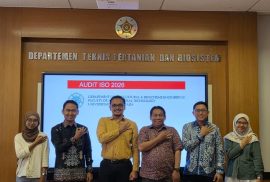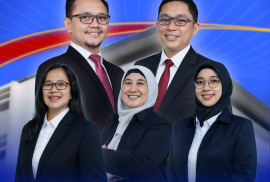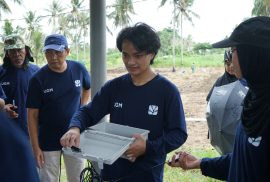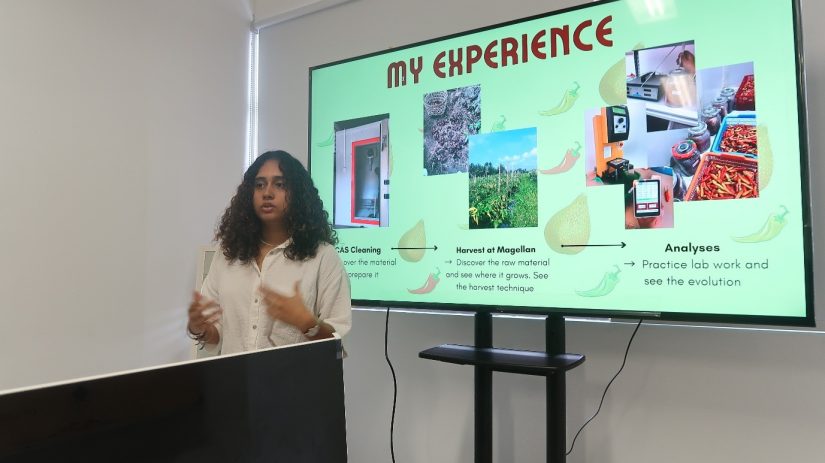
Yogyakarta, July 18, 2025 – An international master’s student from ESIROI (École Supérieure d’Ingénieurs Réunion Océan Indien / Graduate School of Engineering Réunion Indian Ocean), France, delivered her final internship presentation at the Faculty of Agricultural Technology, Universitas Gadjah Mada (FTP UGM). The presentation, titled “Effect of Storage Conditions on the Evolution of Chili and Salak”, took place in the discussion room of the Food and Postharvest Engineering Laboratory at FTP UGM.
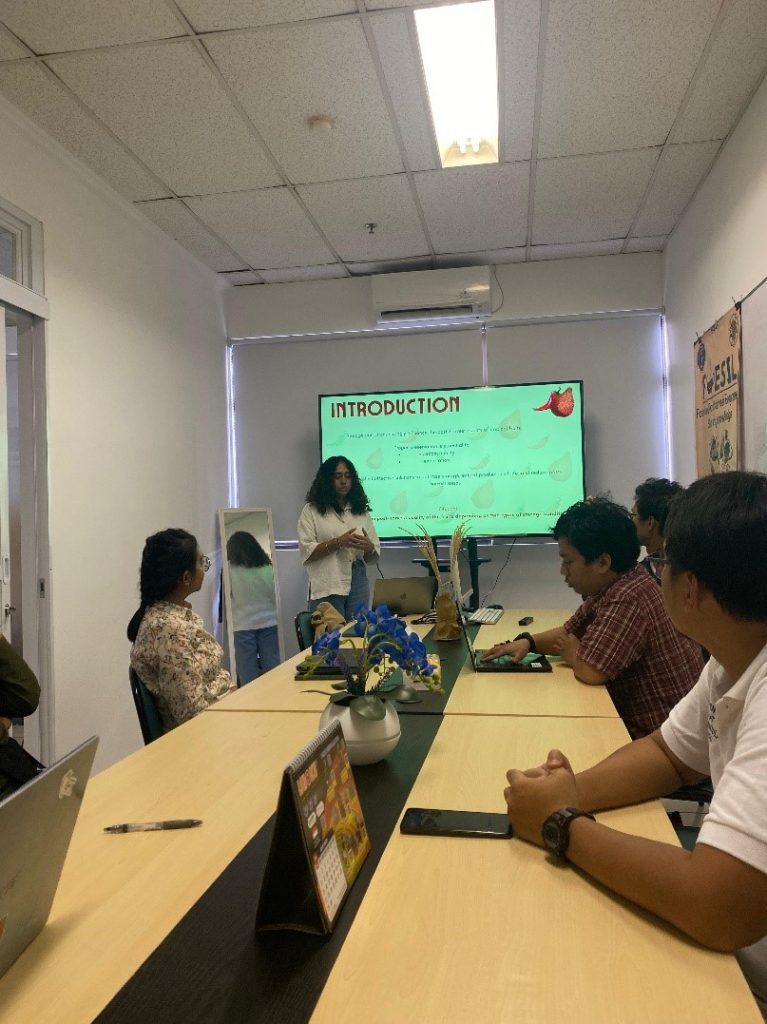
Lea, a student from Réunion Island, presented the results of her research on the effects of different storage conditions on the quality and shelf-life of salak and chili. The three storage treatments studied included Controlled Atmosphere Storage (CAS), sealed tube storage, and regular room temperature storage. During her presentation, Lea explained the research methodology, observational data, and analysis of the quality changes in the fruits throughout the storage period.
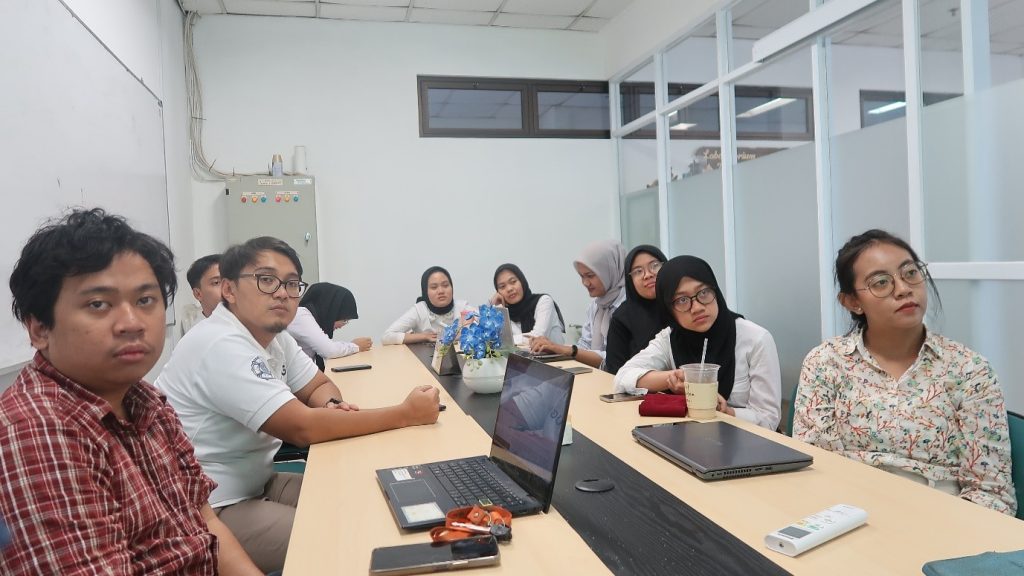
The event was attended by Bayu Nugraha, S.T.P., M.Sc., Ph.D., who served as Lea’s academic supervisor during the exchange program, along with students from the Agricultural Engineering Department involved in the CaPT (Computer-aided Postharvest Technology) research group. The presentation was followed by an engaging question-and-answer session and a scientific discussion that encouraged cross-cultural knowledge exchange.
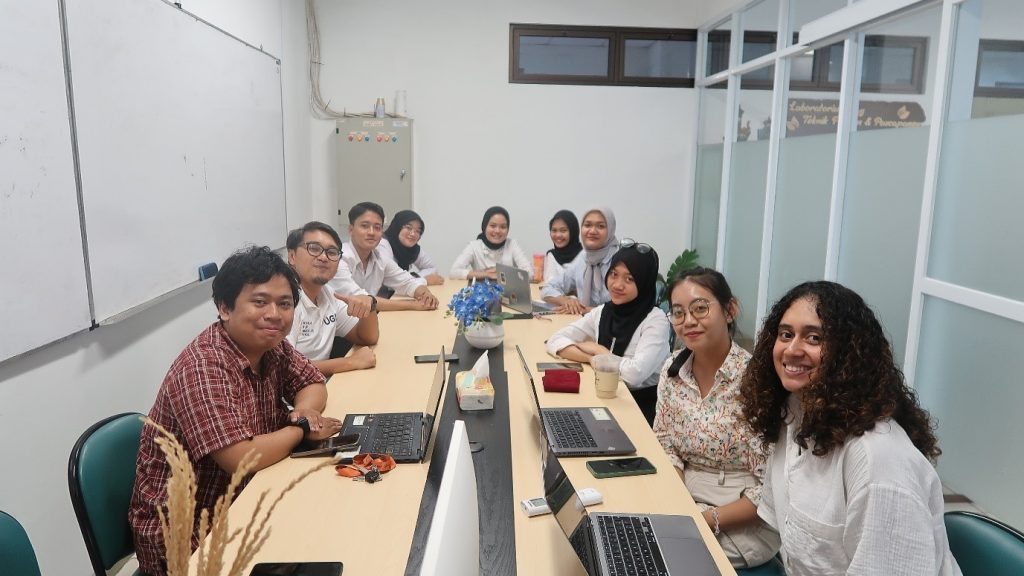
Participants expressed their appreciation for Lea’s hard work and contributions to this research activity. It is hoped that the findings of this study will not only support academic development at ESIROI but also open up further opportunities for collaboration between FTP UGM and other international institutions.
This program also contributes to several Sustainable Development Goals (SDGs):
-
SDG 2 (Zero Hunger): through postharvest food resilience research;
-
SDG 4 (Quality Education): by facilitating international knowledge exchange;
-
SDG 12 (Responsible Consumption and Production): via efficient storage technologies;
-
SDG 17 (Partnerships for the Goals): through collaborations between higher education institutions.
May this activity serve as a starting point for strengthening joint research and advancing postharvest technology with positive global impact.
Lea, mahasiswa asal Pulau Réunion, memaparkan hasil penelitiannya bersama kelompok riset CaPT (Computer-aided Postharvest Technology) terkait pengaruh berbagai kondisi penyimpanan terhadap kualitas dan ketahanan buah salak dan cabai. Tiga perlakuan penyimpanan yang diuji meliputi Controlled Atmosphere Storage (CAS), penyimpanan dalam tabung tertutup, dan penyimpanan suhu ruang biasa. Dalam pemaparannya, Lea menjelaskan metodologi yang digunakan, data hasil pengamatan, serta analisis perubahan mutu buah selama penyimpanan.
Presentasi ini dihadiri langsung oleh Bayu Nugraha, S.T.P., M.Sc., Ph.D. sebagai dosen pembimbing selama program pertukaran berlangsung, serta mahasiswa Teknik Pertanian yang tergabung dalam kelompok riset CaPT (Computer-aided Postharvest Technology). Acara berlangsung dengan antusias, disertai sesi tanya jawab dan diskusi ilmiah yang mendorong pertukaran pengetahuan lintas budaya.
Para peserta menyampaikan apresiasi atas dedikasi dan kontribusi Lea dalam kegiatan riset ini. Diharapkan, hasil penelitian ini tidak hanya memberikan dampak positif bagi pengembangan akademik, tetapi juga menjadi sarana pertukaran ilmu pengetahuan serta mempererat hubungan internasional antara FTP UGM dan berbagai institusi global di masa mendatang. Program ini turut mendukung pencapaian beberapa Tujuan Pembangunan Berkelanjutan (SDGs):
- SDG 2 (Tanpa Kelaparan): melalui riset peningkatan ketahanan pangan pascapanen;
- SDG 4 (Pendidikan Berkualitas): melalui pertukaran pengetahuan internasional;
- SDG 12 (Konsumsi dan Produksi yang Bertanggung Jawab): lewat teknologi penyimpanan yang efisien;
- SDG 17 (Kemitraan untuk Mencapai Tujuan): melalui kolaborasi antar institusi pendidikan tinggi.
Dengan adanya agenda ini menjadi langkah awal bagi penguatan riset bersama dan pengembangan teknologi pascapanen yang berdampak positif secara global.

